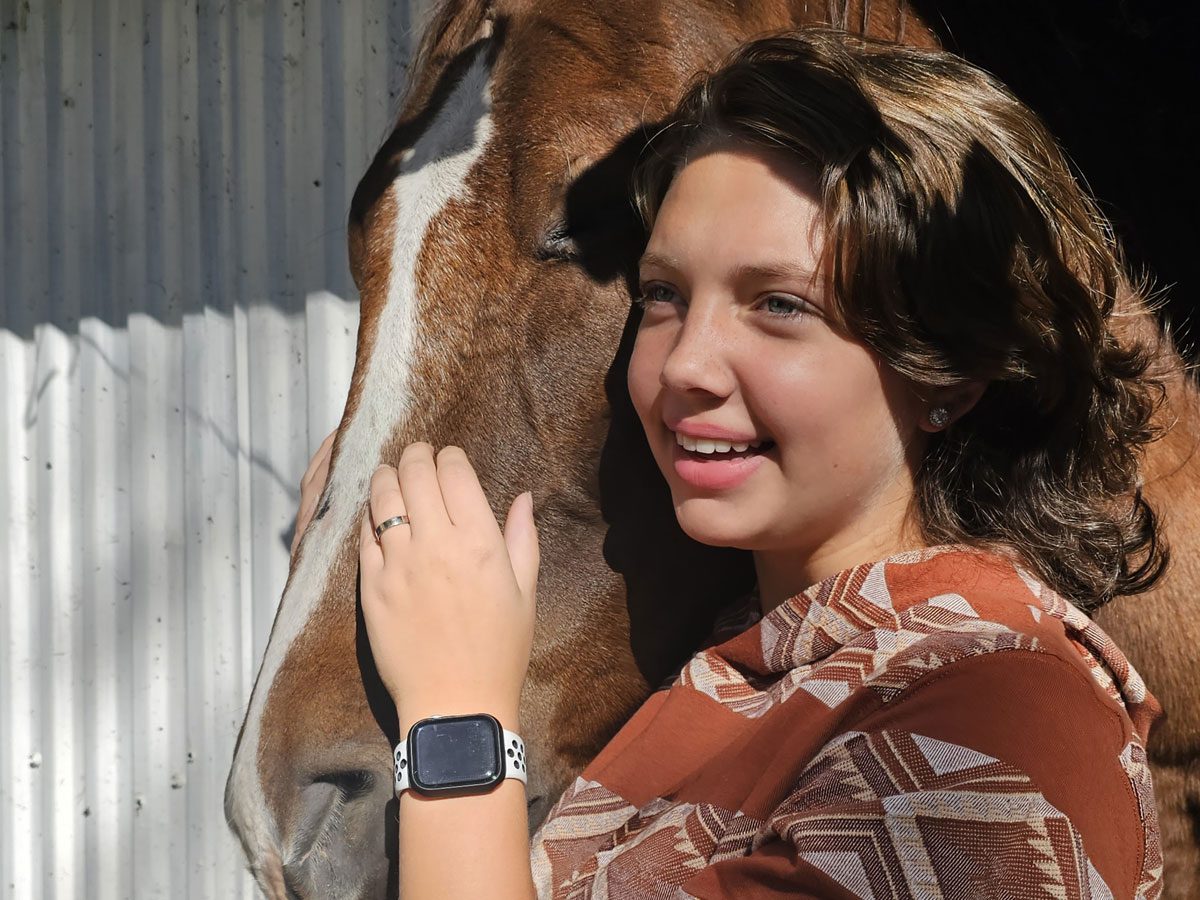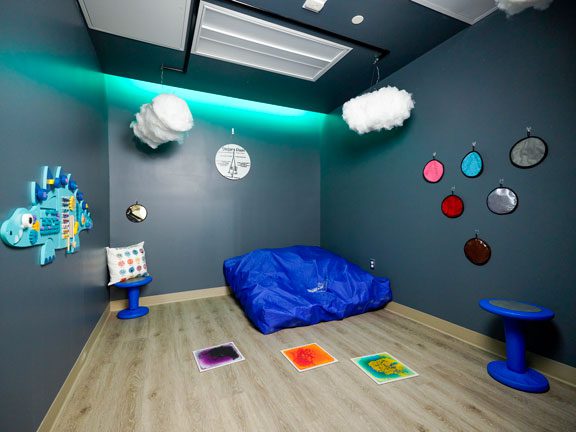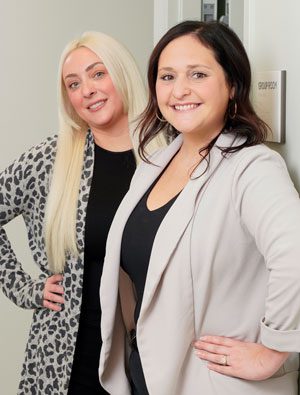Inspira Health: The Autism Diagnosis

Amelia Holmes
Inspira Health’s new center provides vital help when it’s needed most
WHEN PARENTS SUSPECT THEIR CHILD may be on the autism spectrum, the instinct to help and understand their unique child’s needs often drives them to seek official testing. And that’s when most face a major hurdle: The wait for an appointment at most diagnostic centers can be incredbly long – often over a year. These delays block access to essential evaluations that unlock vital services and can make a profound difference in their child’s life.
In South Jersey, this landscape has changed significantly with the opening of Inspira Health’s Autism Diagnostic Center. Since launching last year, the center has given hundreds – children, adolescents and adults who were once in limbo – an accurate diagnosis and guidance on the support they need, says Program Manager Beverly Lynch, LCSW.
“New Jersey provides really good services for people on the autism spectrum,” says Lynch. “It’s getting the diagnosis that has always been the barrier.” This challenge is particularly severe in the rural areas served by Inspira Health, says April Venable, Senior Vice President of Operations Strategy and Transformation.

Sensory Room
“Across the state, there are diagnostic services, but until our center opened, there was nowhere to go in our pocket of Gloucester, Salem and Cumberland,” says Venable.
The demand for the center’s services became immediately apparent, even before its official opening was advertised, she says. Word of mouth alone led to a flood of calls from parents, many reporting 18-month waits at diagnostic centers in Philadelphia and Wilmington.
“This has just really taken off,” Venable says. “We’ve been getting incredible feedback about the patient experience, the work the clinicians are doing, and how helpful they are with referrals for ongoing services.”
Housed at the Inspira Health Center in Woodbury, the center offers autism testing plus help navigating the next steps. Social skills groups are coming soon. Serving children as young as 4 to adults, the center accepts a wide range of insurance plans, including Medicaid and managed care.
The center has a welcoming air. There is space for group activities as well as a sensory room, equipped with soft lighting, comfortable seating, tactile objects and visual aids to put children at ease.
Central to its offerings is its use of the Autism Diagnostic Observation Schedule 2 (ADOS2), considered the gold standard for diagnosis, says Lynch.
“This is the key to the door that opens all of those services that people on the autism spectrum qualify for under the Americans with Disabilities Act (ADA),” she says. “For a child to receive an IEP (Individualized Education Plan) to get educational services and support crucial to avoiding developmental delays, the schools need the diagnosis and the official comprehensive reports we provide. It’s what they need to receive services from the state, gain access to summer camps that are specific to children on the spectrum as well as financial support and respite services.”
The center helps the newly diagnosed understand the contents of their reports and leverage the information to get the help they need. “For many, it’s such a relief to get the diagnosis,” Lynch says. “However, it can also be upsetting and unsettling. We are there helping them adjust and figure out what to do next.”
The center recently added a patient navigator to assist with every step of the process,” Lynch says. The navigator helps clients identify where to go for services and will even reach out to make any necessary connections.
“Having somebody who can help walk you through these complexities can be a huge relief for many,” Lynch adds, noting that staff is plugged into South Jersey’s autism community and has a deep knowl edge of programs in the area.
The inception of the center was driven by a sharp recognition of the unmet needs it now addresses, says Lynch, who also runs Inspira Health’s child partial hospitalization program, a short-term behavioral health treatment day program for children.
It was through that program that 2 licensed clinical social workers on Lynch’s team, Megan Zold, LCSW, ASDCS and Kate McMullin, LCSW, RPT, ASDCS noticed a troubling pattern through the years. Many children cycling through had what they believed to be undiagnosed autism, contributing to the behavioral issues that brought them to treatment.
“We were able to recognize this and provide the right support while they were with us, but once they graduated from our program and were back in their schools, they weren’t eligible for any autism-related services,” Lynch says.
Although the clinicians were empowered to recognize kids with autism within the confines of their program, she says, they were not authorized to produce the official autism diagnosis and documentation required for them to receive broader access to services.

Kate McMullin, LCSW, RPT, ASDCS and Megan Zold, LCSW, ASDCS
“Megan and Kate wanted to understand the diagnosis better and took it upon themselves to further their education,” she says, noting that both enrolled in master’s degree programs in Applied Behavior Analysis (ABA) and completed further training during the pandemic. They now have the certification necessary to formally diagnose the condition.
“This initiative quickly proved its worth,” Lynch says. “As we noticed the significant demand within this group, we recognized the broader impact we could have on the community at large.”
For Amelia Holmes, a 15-year-old from Millville, the opening of the Autism Diagnostic Center arrived at a pivotal moment. According to her mother, Amy, Amelia’s path to an autism diagnosis was fraught with challenges. The highly intelligent, intensely curious girl has endured bullying and misunderstanding due to her intense emotions, impulsivity and difficulties relating to peers. It got so bad that Amelia was in crisis counseling at 7 for suicidal ideation, says Amy. A diagnosis of ADHD in 6th grade helped her gain access to services and better understand herself. But then last year, Amelia received her diagnosis at the center, which was a turning point, says Amy.
“Amelia wears her autism label with pride,” Amy says. “She’s been fully able to let go of the guilt she internalized from all the adults who made her feel there was something wrong with her or that she was a bad kid.”
Lynch notes that while most of the testing is for children, adults are also seeking the services. “We’ve tested people who are 45 years old who have wondered their whole lives if maybe they’re on the autism spectrum,” she says. “It really helps them understand themselves better when they finally get the diagnosis.”
Within the next few months, the center plans to introduce social skills groups, with a special emphasis on programs for adolescents and teens.
“Many of these neurodivergent teens and young adults are pretty much virtual in their social relationships,” Lynch says. For them, group work will focus on reinforcing social skills, such as initiating greetings, participating in conversations, and building and maintaining friendships.
Plans are also underway to open a second location in Bridgeton, says Venable.
“We will evolve as we grow,” she adds. “The Autism Diagnostic Center was just an idea less than 2 years ago, and look where we are already today.”
A special thank you to N.J. State Senator Nilsa Cruz-Perez, Assembly Majority Leader, Louis D. Greenwald and Assemblyman William F. Moen, Jr. for their tireless support in championing this effort to provide this service to children, adults and families throughout South Jersey. -Inspira Health
Autism Diagnostic Center
17 West Red Bank Avenue, 3rd floor – Suite 308
Woodbury, NJ 08096
856-575-4111 | inspirahealthnetwork.org


